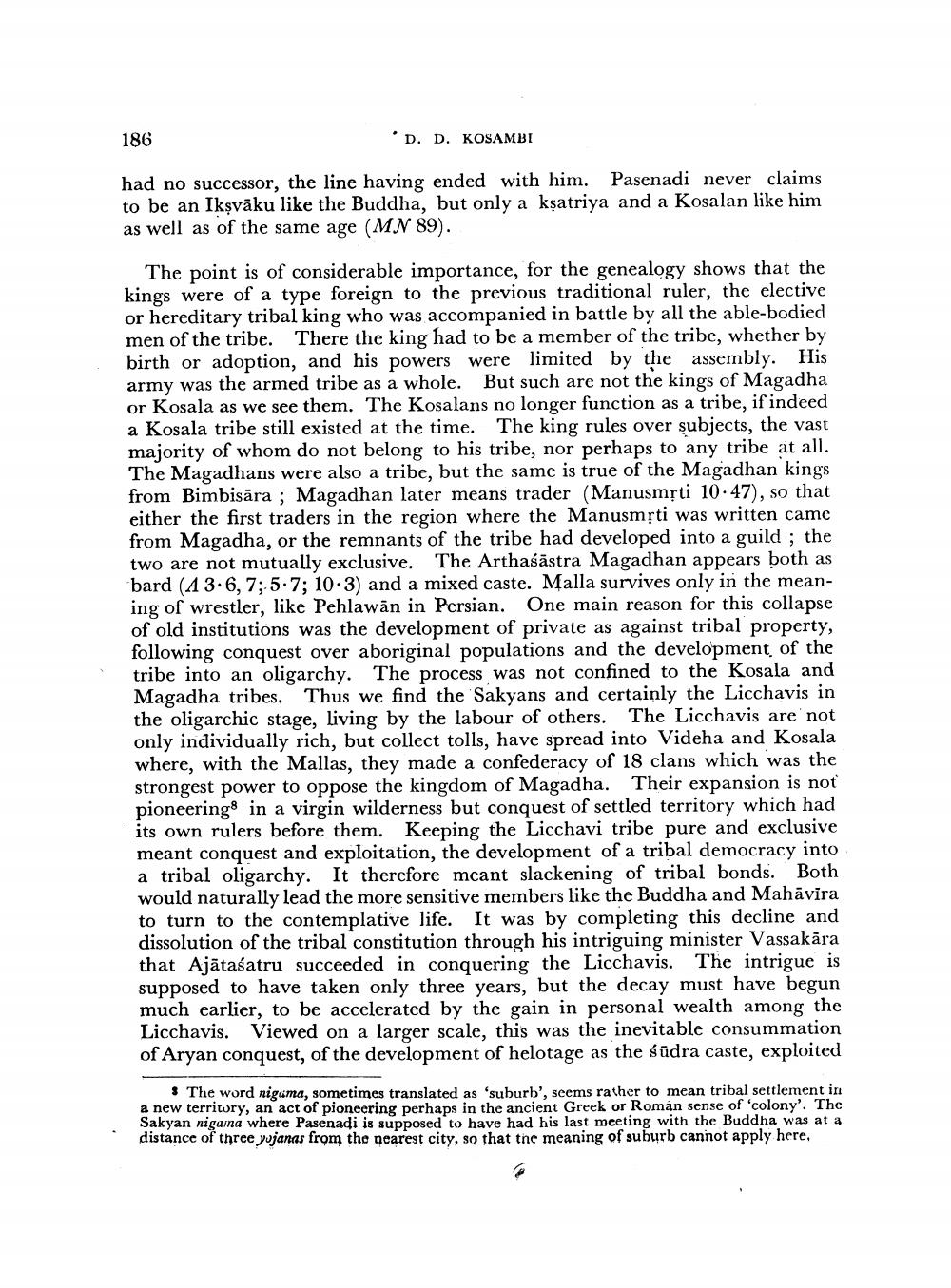Book Title: Ancient Kosala And Mmagadha Author(s): Dharmanand Kosambi Publisher: D D Kosambi View full book textPage 7
________________ 186 D. D. KOSAMBI had no successor, the line having ended with him. Pasenadi never claims to be an Ikşvāku like the Buddha, but only a ksatriya and a Kosalan like him as well as of the same age (MN 89). The point is of considerable importance, for the genealogy shows that the kings were of a type foreign to the previous traditional ruler, the elective or hereditary tribal king who was accompanied in battle by all the able-bodied men of the tribe. There the king had to be a member of the tribe, whether by birth or adoption, and his powers were limited by the assembly. His army was the armed tribe as a whole. But such are not the kings of Magadha or Kosala as we see them. The Kosalans no longer function as a tribe, if indeed a Kosala tribe still existed at the time. The king rules over subjects, the vast majority of whom do not belong to his tribe, nor perhaps to any tribe at all. The Magadhans were also a tribe, but the same is true of the Magadhan kings from Bimbisāra ; Magadhan later means trader (Manusmộti 10.47), so that either the first traders in the region where the Manusmộti was written came from Magadha, or the remnants of the tribe had developed into a guild ; the two are not mutually exclusive. The Arthaśāstra Magadhan appears both as bard (A 3.6, 7;5.7; 10.3) and a mixed caste. Malla survives only in the meaning of wrestler, like Pehlawān in Persian. One main reason for this collapse of old institutions was the development of private as against tribal property, following conquest over aboriginal populations and the development of the tribe into an oligarchy. The process was not confined to the Kosala and Magadha tribes. Thus we find the Sakyans and certainly the Licchavis in the oligarchic stage, living by the labour of others. The Licchavis are not only individually rich, but collect tolls, have spread into Videha and Kosala where, with the Mallas, they made a confederacy of 18 clans which was the strongest power to oppose the kingdom of Magadha. Their expansion is not pioneering8 in a virgin wilderness but conquest of settled territory which had its own rulers before them. Keeping the Licchavi tribe pure and exclusive meant conquest and exploitation, the development of a tribal democracy into a tribal oligarchy. It therefore meant slackening of tribal bonds. Both would naturally lead the more sensitive members like the Buddha and Mahāvira to turn to the contemplative life. It was by completing this decline and dissolution of the tribal constitution through his intriguing minister Vassakāra that Ajātaśatru succeeded in conquering the Licchavis. The intrigue is supposed to have taken only three years, but the decay must have begun much earlier, to be accelerated by the gain in personal wealth among the Licchavis. Viewed on a larger scale, this was the inevitable consummation of Aryan conquest, of the development of helotage as the sūdra caste, exploited $ The word nigama, sometimes translated as 'suburb', seems rather to mean tribal settlement in a new territory, an act of pioneering perhaps in the ancient Greek or Román sense of 'colony'. The Sakyan niganna where Pasenadi is supposed to have had his last meeting with the Buddha was at a distance of three yojanas from the nearest city, so that the meaning of suburb cannot apply here,Page Navigation
1 ... 5 6 7 8 9 10 11 12 13 14 15 16 17 18 19 20 21 22 23 24 25 26 27 28 29 30 31 32 33 34
